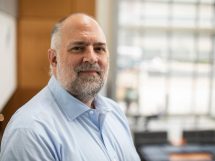LEXINGTON, Ky. (Nov. 21, 2013) ― University of Kentucky President Eli Capilouto ran through a lengthy list Thursday for legislators of the benefits taxpayers and state residents get from the commonwealth’s $284 million budget allocation to its flagship research university.

Capilouto was testifying to members of the General Assembly’s Interim Economic Development Committee, which met on the university’s campus.
“We leverage the state’s $284 million investment to do remarkable things for Kentucky and beyond,” Capilouto told legislators in UK’s Student Center Ballroom. “UK has a meaningful, statewide impact through our people and mission. We hope you are proud of what we have accomplished together.”
Capilouto presented legislators with what he called UK’s Return on Investment to the Commonwealth.
The $284 million annual appropriation from the state represents about 10 percent of the university’s $2.7 billion annual budget. Despite the relatively small percentage, Capilouto said the state appropriation represents the foundation for much of what UK does for the commonwealth, helping fuel:
• A $1 billion healthcare enterprise and hospital
• More than 5,000 bachelor’s, master’s, doctoral and professional school graduates in each of the last 10 years and 6,000 at the end of the most recent academic year
• A statewide extension service with offices in each of the state’s 120 counties
• Faculty and staff who conduct nearly $354 million in research and one of the handful of self-sustaining athletics programs in the country, which contributes millions annually to academic programming and scholarships.
Here’s a partial breakdown of the numbers and their impact on Kentucky.
Employees and taxes
Collectively, UK is Lexington’s largest employer by far ― and the state’s second largest ― with more than 12,000 full-time employees, Capilouto said. That workforce generates more than $78 million annually in state and local payroll tax revenue.
“But more important than the revenue is the impact of our people,” he said, citing Lexington’s recent designation by The Wall Street Journal as a “brain hub” because of educational attainment levels of citizens here.
Furthermore, Capilouto told legislators that more than 105,000 UK graduates are living in the commonwealth ― including students who came to UK from other states.
Research and the new economy
UK last year conducted $354 million in externally funded research. That research enterprise, Capilouto said, is the equivalent to a company with a direct annual payroll of $240 million.
Capilouto praised legislators for their commitment to research through past funding of the Bucks for Brains program, which afforded UK the opportunity to recruit some 300 endowed faculty chairs and professors, who generated additional research dollars.
As a result, he said, data collected by the National Science Foundation lists UK 38th among public institutions in research and 17th among public, land-grant universities.

More important, Capilouto said, the research being conducted is focused, in large part, on Kentucky’s most intractable challenges ― from cancer and coal to spinal cord and brain injuries to Parkinson’s disease.
Capilouto said investments the state has made in people and capital ― like the Pharmacy Complex and Biological/Biomedical Research Building ― gave UK the opportunity to compete for and win designation as a National Cancer Center from the National Cancer Institute ― becoming Kentucky’s only NCI-designated cancer center.
Today, UK is one of only 22 institutions in the country with three major federal research designations ― in cancer, for aging and in translational science.
Capilouto said those recognitions are particularly important in a health area like cancer. UK’s Markey Cancer Center, for instance, serves 41 of the 54 most distressed counties in Appalachia. Kentucky has the highest rate of cancer deaths in the country per 100,000 people and more than 25,000 new cases were diagnosed in 2012.
But what will the future hold for UK’s ability to continue ― and expand upon — such research, Capilouto asked legislators.
“This is where we are today,” he said, citing the accomplishments in healthcare, energy and economic development. “But will we be able to recruit and keep top-talent in Kentucky tomorrow?”
Capilouto said answering “yes” to that question is critically important for the university and the state. But after more than $50 million in recurring budget reductions since 2008 and little to no direct state investment in infrastructure in that time, “we face a deficit of modern research space on our campus.”
Service to the commonwealth
Citing visits he has made across the state to UK’s extension offices, Capilouto told legislators that, quite simply, “the commonwealth is our campus. Service is a part of our DNA.”
In particular, with offices in all 120 counties, the Cooperative Extension Service last year alone helped more than 16,000 individuals implement at least one financial management strategy. More than 64,000 families made healthy food choices as a result of extension assistance and more than 180,000 young people were reached through 4-H programs.
Similar in scope and reach, Capilouto said UK HealthCare’s transformation in the last 10 years under the leadership of Dr. Michael Karpf has placed the university’s hospitals among the top academic medical centers in the country.
The numbers, he said, are startling:
• An increase in hospital revenues from $300 million to $922 million in the last decade and an increase of nearly 3,000 jobs between 2004 and 2012.
• 35,511 hospital discharges in Fiscal Year 2013, up from about 19,000 10 years ago, and nearly 450,000 outpatient visits
• Service to patients in all 120 counties
• Self-financing of a $1 billion hospital.
“We can have this impact on Kentucky because of our network of outreach clinics,” Capilouto said. “Health practitioners are working in local communities so Kentucky families know that whatever illness that may befall them they can receive quality care in their backyard.”
The Future
Finally, Capilouto told legislators that UK is underway with one of the most ambitious building efforts in all of public higher education ― building that, thus far, is completely self-financed through philanthropy, internal resources and an unprecedented partnership with athletics.
UK is currently underway with an initiative, authorized by the governor and legislature, to build up to 9,000 new residence hall beds, utilizing up to $500 million in private equity through a unique public-private partnership.
“We do this not for bricks and mortar,” he said, “but for what these facilities allow us to do.”
Students who live on campus, for example, have higher grade point averages and are retained at higher levels than those who live off-campus, Capilouto said.
And in terms of economic impact, the first two phases of the residence hall project have generated ― or are generating ― more than 7,000 direct and indirect jobs and more than $7.5 million in state and local taxes, he said.
Now, with the approval earlier this year of House Bill 7, UK has started another phase of its campus revitalization program, constructing without new state dollars some $275 million in facilities.
Capilouto said some $45 million has been pledged or raised for the $65 million renovation and expansion of the Gatton College of Business and Economics. A new design for the $110 million renovation of Commonwealth Stadium will be unveiled next week, and work is set to begin soon on the $100 million Academic Science Building ― $65 million of which is being financed by UK Athletics.




















Add Comment